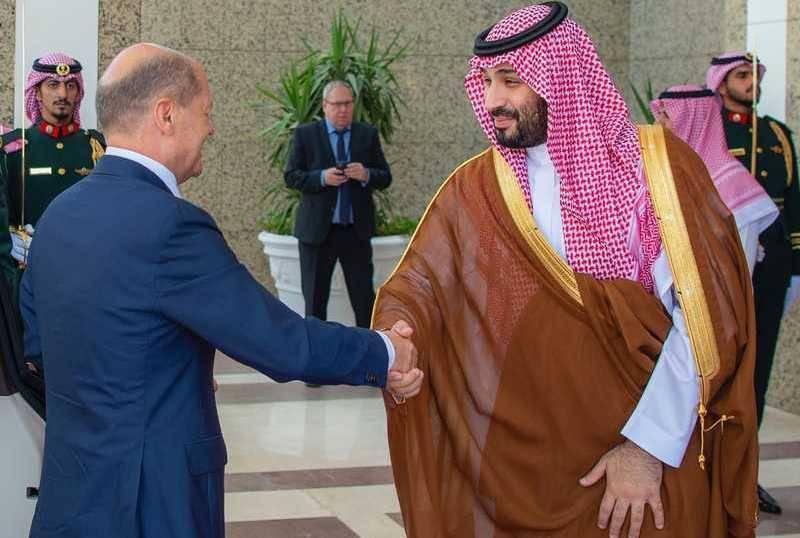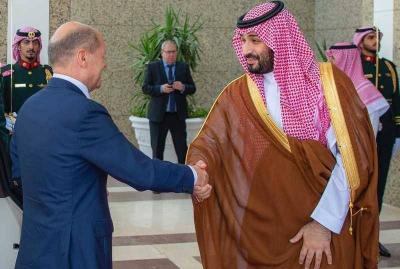In an effort to avoid a crisis before a severe winter in Berlin, German Chancellor Olaf Scholz is seeking to secure energy supply deals with Gulf states through his visits to Saudi Arabia, the UAE, and Qatar in succession. Although he has not signed contracts with Saudi Arabia, Scholz succeeded in striking liquefied natural gas supply deals with the UAE while preparing to visit Qatar in pursuit of larger agreements. Scholz is racing against time to find new suppliers to compensate for soon-to-be-exhausted Russian gas shipments, as the continent braces for a challenging winter amidst a supply shortage. He is accompanied by a large delegation including representatives from various economic sectors, including energy.
Gulf analysts interviewed by Al-Hurra believe that energy-rich Gulf states can assist Germany in compensating for the nearly halted Russian energy flows to Berlin. Western sanctions on Russia are redirecting global energy flow, as Russian production moves eastward, making the Gulf likely to become a larger supplier to the West, according to The Economist magazine. The British magazine stated that the Gulf region will probably remain significant in global affairs in the coming decades, just as it was in the 20th century. Experts expect that Gulf oil and gas exports will constitute 20 percent of European imports, up from the current 10 percent.
#### A Partnership Driven by "Historical Relations"
On Saturday, Scholz met with Saudi Crown Prince Mohammed bin Salman in Jeddah, while on Sunday he will meet the President of the UAE, Sheikh Mohammed bin Zayed, concluding his Gulf tour in Qatar on Monday. Fawaz bin Kassem Al-Anzi, an expert in Middle Eastern affairs, stated that Gulf states "can help Germany face the harsh winter," especially since they have "long-standing historical relations" with Berlin. The Saudi analyst added that "the partnership encourages Saudi Arabia to assist Germany in exporting part of its traditional energy, and Qatar has ample gas and can help."
Scholz’s visit also reflects the "historical relations" between Germany and Gulf states, which are energy powerhouses, at a time when the Kingdom relies on importing certain German industrial products, motivating Riyadh to "maintain global energy security" due to the Russian war on Ukraine by assisting Germany, according to Al-Anzi speaking to Al-Hurra.
No official statement was released regarding the substance of the German Chancellor's meeting with the Saudi Crown Prince, but German channel NTV quoted Scholz saying, "We have long-standing economic and political relations with the Kingdom of Saudi Arabia, so it's important... for us to be here today and at other stops on my tour to continue discussing the region's development and opportunities for economic relations, but also the political challenges ahead."
In the UAE, political analyst Mohammed Taqi believes that Abu Dhabi can support Germany in the energy sector "based on common interests, just as it happened with France." He stated to Al-Hurra that Abu Dhabi is "in a phase of strengthening relations" with Berlin, predicting that the current German leadership will prioritize "its interests above any other considerations."
Unlike his visit to Saudi Arabia, Scholz signed an agreement in the UAE stipulating the supply of liquefied gas and diesel to the European country in 2022 and 2023, according to the UAE government news agency. The agreement includes the export of a liquefied natural gas shipment to Germany by late 2022 and additional shipments in 2023. The agency announced the completion of a direct delivery process for a diesel shipment in September and the agreement to supply up to 250,000 tons monthly of diesel fuel during 2023.
#### Economic Agreements or Political Bias?
Regarding Qatar, Berlin had previously entered talks with Doha to purchase liquefied natural gas shipments without reaching concrete results. Qatari analyst Ali Al-Hail explains that "Germany wants to sign short-term contracts, while Qatar rejects this as its contracts with China, India, Japan, and South Korea extend to 25 years, which is why no agreement has been reached." He stated to Al-Hurra prior to Scholz's arrival in Qatar that "Germany and the European Union will suffer greatly this time; because winter is knocking at the doors" while Russian gas flows have come to a halt.
Despite Germany signing an agreement with the UAE, Al-Hail sees it as challenging to "compensate" for Russian gas for Europe overall, considering that Russia is closer and can supply the continent through pipelines, coupled with the abundant quantities and "lower price of Russian gas compared to Qatari, Emirati, or Algerian gas." He questioned the mechanism for transporting Qatari gas to Germany and then converting it to Europe, considering it a "complicated issue," noting that "transporting liquefied gas by ships takes a long time unlike pipelines."
The Nord Stream 1 pipeline transports 55 billion cubic meters of gas annually from Russia to Germany under the Baltic Sea, but Russia halted gas flows in July due to what Moscow calls "maintenance operations." Al-Hail stated that the need for Russian gas "remains preferable (for the European continent) than relying on other gas sources."
Following the Kremlin's invasion of Ukraine last February, Europe began seeking alternatives to Russian energy sources after Western nations imposed severe sanctions on Moscow. Scholz told reporters before arriving in the UAE that "the current major challenge is definitely the situation the world is experiencing after the Russian attack on Ukraine. This has international consequences." He added, "I made it clear that it is important for us to support Ukraine in defending its security and sovereignty, and that we will continue to do so, and that Russia must withdraw its forces."
The flow of Gulf energy to Germany raises serious questions about the political stance of Gulf states regarding the war in Ukraine. Gulf states have called for an end to the war and for a political settlement, yet they have avoided directly criticizing Moscow amid growing economic ties with it, particularly cooperation in oil production through the OPEC+ group led by Saudi Arabia and Russia. While both Al-Anzi and Taqi agree that any flow of energy shipments to Germany will be purely "economic," Al-Hail believes that Russia "will view it as a bias from the three countries with the European Union, which has become a direct party in the war in Ukraine."




